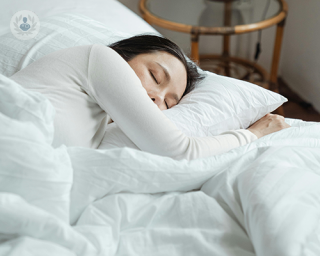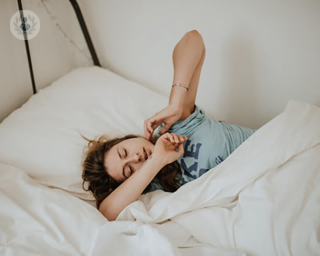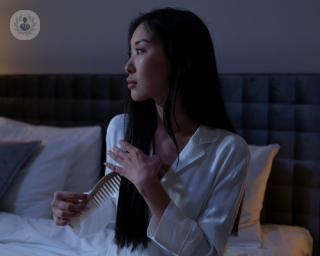Insomnia
What is insomnia?
Insomnia is one of the most common sleep disorders and is defined as the inability to fall asleep or stay asleep, despite having the opportunity to sleep. This lack of rest prevents the body from recovering at night and as a consequence can cause daytime sleepiness, low concentration and an inability to feel active during the day. Insomnia can occur at bedtime, at night or in the mornings.

Are there different types of insomnia?
There are different types of insomnia:
- Acute or short-term insomnia, which usually lasts for a number of days, weeks or up to six months. It's a fairly common type of insomnia and the most typical causes include stress at work, family pressures or a traumatic event.
- Long-term or chronic insomnia can last a month or more. Most cases of chronic insomnia are secondary, meaning that chronic insomnia is the symptom or side effect of another problem, such as certain medical problems, medications, and other sleep disorders. It isn't often that there are cases of primary chronic insomnia. Long-term stress, emotional distress, travel and shift work can be factors. Some substances like caffeine, tobacco, and alcohol can also be a cause of insomnia.
What are the symptoms of insomnia?
Insomnia symptoms include:
- Difficulty falling asleep
- Difficulty staying asleep
- Waking early in the morning
- Feel irritable and tired during the day
These symptoms occur despite having the opportunity to sleep.
How is insomnia diagnosed?
To diagnose insomnia, your specialist will take the following into account:
- Medical history
- Sleep history (details about sleeping habits)
- A physical exam to rule out other medical problems that can cause insomnia
- A sleep study
What are the causes of insomnia?
Common causes of insomnia include:
- Anxiety, depression or stress
- Shift work
- Jet lag
- Recreational drugs
- Alcohol
- Caffeine
- Tobacco
- Noise
- An uncomfortable bed
- An uncomfortable sleeping environment (e.g. too hot or too cold)
- Other medical conditions (e.g. Parkinson’s and Alzheimer’s)
- Overactive thyroid
- Pain
- Side effects of medication
Can insomnia be prevented?
Keep in mind that not everyone who has trouble sleeping has insomnia.

To avoid insomnia, it is important to have good sleep hygiene:
- Bedtime: sleep follows a rhythm, which if we break it, can cause sleep disturbances. This is why it is important to try to go to sleep at more or less the same time every day because if you go to bed earlier, the body does not recognise that your 'bedtime' has arrived, and it will prove challenging to fall asleep.
- Wake up time: be aware that the time we get up determines the time we will fall asleep later on.
- Napping: a person with insomnia is not advised to take naps during the day, as this will aggravate their nocturnal insomnia.
- Diet: it isn't recommended to go to bed hungry or on an overly full stomach. Stimulating drinks such as coffee or caffeinated tea should not be consumed in the afternoon, as a general rule, and insomniacs should try to avoid them.
- Exercise: Exercising throughout the day can cause beneficial fatigue, but you should avoid exercising in the late afternoon.
- Ritual: Following a series of steps before bedtime, such as putting on pyjamas, brushing teeth, brushing hair, or taking a bath, can signal to the body that bedtime is approaching.
The most important thing is for the person to relax before bed. There is no point in trying to fall asleep when you are stimulated or full of energy, so relaxation measures can be helpful. If the insomniac still cannot fall asleep, it is preferable to get out of bed and wait for sleep, rather than staying in bed.
How is insomnia treated?
In order to treat insomnia, the first thing to know is the type of insomnia, and what is causing it. For example when insomnia is a symptom or side effect of another problem, it's important to treat the underlying issue.

Treating insomnia can be approached in a number of ways:
- Lifestyle changes: having good sleeping habits can help alleviate acute (short-term) insomnia.
- Cognitive behavioural therapy, which is specialised therapy for sleep as a whole, can help alleviate anxiety related to insomnia.
- Various medications can also help alleviate insomnia and help restore a regular sleep schedule.
Can insomnia be cured?
It's possible to cure most cases of insomnia, but expert advice, treatment and commitment to keep to a sleep hygiene plan is advised.
Which specialist treats insomnia?
Insomnia is a condition that can be treated by different specialties. Specialists who can help to treat insomnia are neurologists, psychiatrists and psychologists.
















